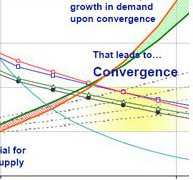Think of this as Volume 18, Number 16 of the newsletter I have written weekly since March, 1997. Enjoy.

The Civil War was about tariffs and states' rights, according to the South. It was about slavery, according to the North. But it was really about mechanization, about machine power replacing human power. Manufacturing won the war, and provided America's new economic model.
The same was true during the Progressive Era a generation later. It seemed to be about human dignity and the power of corporations. It was really about national markets and the inputs needed for mass manfacturing.
Again, the New Deal. Economic collapse? Not really. It was about economic systems, the false choices of fascism and communism on one hand, democracy and capitalism on the other.
The same was true with Vietnam. It seemed to be about the Cold War, when it was really about a switch from manufacturing to technology, from hands to minds, as the center of economic life.
Which brings us to the present day.

But what is really at issue is the fate of the Earth, and whether any economic model can save it. Will mankind use capitalism to destroy what made this world livable, or will we find economic models that let us live in closer harmony with the natural order?
Environmentalists claim to be very angry with this President. I can understand that. They don't see that before environmental progress can happen, economic progress is an absolute requirement. The boom in natural gas created by fracking is a bridge under which renewable energy abundance is being built, and it's this abundance that is going to drive real change.
I have always had a problem with “hair shirt” environmentalism. This is the idea that prosperity and environmentalism are somehow incompatible, that they are at odds.
They're not. Prosperity is a necessary precondition to tackling environmental problems.

As life expectancies rise, birth rates decline. Botswana is down to 2.7. Brazil is down to 1.8, which is in line with most western countries, including the U.S. The current rates, in fact, are well below replacement, which is why we had that famous Danish “go have sex” ad.

Americans take this for granted. Africans see it as a dream. But now that dream is being realized. About 1 billion people joined this global middle class since the turn of the century. It is the greatest economic transformation in history.
Wider global prosperity, and stability, creates a growing market for things that create and tie economies together, like wireless services and renewable energy. Old-fashioned flip phones helped create today's relative prosperity across sub-Saharan Africa. Imagine what smartphones will do, especially when they can be powered by the Sun. Imagine cell towers powered by the Sun. Now stop imagining it.

Photovoltaic solar represented 100 Gwatts of power in 2012, more than five times the total when this President was elected. Wind power is now a serious factor in many states' electric grids. Some 8.3% of grid power in Texas, and 27.4% in Iowa, comes from wind.
The solar and wind policies of this Administration can be fought and even rolled back in some instances, but they have created industries which have momentum of their own, and encouraged an immense amount of innovation. Companies far outside the industry mainstream, like IBM, are now developing solutions that can harvest 87% of the Sun's heat and light, five times more than the best solar panels can harvest alone.
As these solutions enter the market, over the next few years, it will be impossible for any politician or political group to roll back the industry's progress. When solar power and wind power are cheaper to install and use than fossil fuels, resistance will start to crumble.
Just as it was in our past, so it will be today. What seems a political problem is in fact an economic one. Solve the economic problem, turn shortage into abundance, and you move beyond the political problem.

Lincoln's endorsement of Wall Street, McKinley's evolution toward national markets, FDR's creation of a global marketplace, Nixon's support for the economics of technology and content over manufacturing. All these were validated, by U.S. Grant, by Theodore Roosevelt, by Harry Truman and Ronald Reagan. The economic changes the crisis leaders began became new political realities for the succeeding generation.
This is what Barack Obama has been up to. The transformation he has begun in world markets, aimed ultimately at addressing the most potent threat to our survival as a species we've ever faced, has only just begun. But the momentum for change is irresistible, because it is born in markets rather than ballots. This has begun the process of saving your grandchildrens' lives.











But you have switched definitions of Prosperity on us, because your definition is what every environmentalist has been calling Social Equity for years and years and has made it part of their 3-part nonnegotiable agenda, the Triple Bottom Line.
The Prosperity the “hair-shirt envionmentalists” are talking about that we can’t sustain at our current rate is – Well, as a 21st Century American, you KNOW what it is and so do I! Ask anyone you talk to outside of a homeless shelter if they’d settle for the prosperity you describe, step back, and enjoy the rant. Unless they’re with the Catholic Workers or are Buddhist monks or nuns.
Prosperity, in 21st Century America,means a big house crammed full of the latest and most fashionable of everything, a big car, the ability to buy anything they please, and the freedom to burn as much fossil fuel and everything else they please, when and how they please. (Never mind the debt they’re piling up.)
Ask anybody. And very few who have it are willing to step down to even a very modest level.
As for “hope for the future”, there are as many definitions of that as there are people, but the only one we’re selling these days is “Do as we say and you or your children or grandchildren will live – almost! – as high off the hog as we do!”
No, 21st Century Americans would NOT consider your definition of “prosperity” to constitute “prosperity” for them, I’m sorry to say, just for “those others.”
But you have switched definitions of Prosperity on us, because your definition is what every environmentalist has been calling Social Equity for years and years and has made it part of their 3-part nonnegotiable agenda, the Triple Bottom Line.
The Prosperity the “hair-shirt envionmentalists” are talking about that we can’t sustain at our current rate is – Well, as a 21st Century American, you KNOW what it is and so do I! Ask anyone you talk to outside of a homeless shelter if they’d settle for the prosperity you describe, step back, and enjoy the rant. Unless they’re with the Catholic Workers or are Buddhist monks or nuns.
Prosperity, in 21st Century America,means a big house crammed full of the latest and most fashionable of everything, a big car, the ability to buy anything they please, and the freedom to burn as much fossil fuel and everything else they please, when and how they please. (Never mind the debt they’re piling up.)
Ask anybody. And very few who have it are willing to step down to even a very modest level.
As for “hope for the future”, there are as many definitions of that as there are people, but the only one we’re selling these days is “Do as we say and you or your children or grandchildren will live – almost! – as high off the hog as we do!”
No, 21st Century Americans would NOT consider your definition of “prosperity” to constitute “prosperity” for them, I’m sorry to say, just for “those others.”